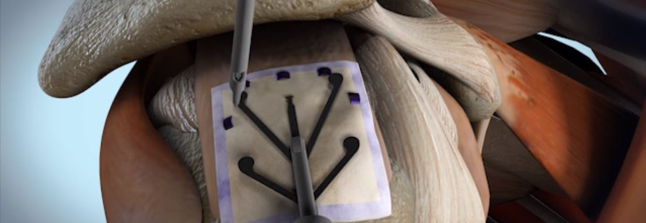
Register to receive a free US Market for Orthopedic Soft Tissue Repair and Sports Medicine report synopsis and brochure
Smith & Nephew recently announced that it has entered into a definitive agreement to acquire Rotation Medical Inc., a developer of a novel tissue regeneration technology for shoulder rotator cuff repair, for an initial cash consideration of $125 million and up to $85 million over the next five years, contingent on financial performance.
“Rotation Medical furthers our strategy to invest in disruptive technologies that accelerate the transformation of Smith & Nephew to higher growth,” said Chief Executive Officer Olivier Bohuon. “The Rotation Medical Rotator Cuff System is an innovative technology serving unmet clinical needs. It is highly complementary to our Sports Medicine portfolio and provides a compelling new treatment option for our customers.”
The system incorporates a breakthrough technology and technique that balances biomechanics and biology to enhance the body’s natural healing response. The bioinductive implant helps tendons heal by inducing growth of new tendon-like tissue, offering the potential to prevent tear progression and reduce the incidence of re-tears. The system also includes a set of disposable arthroscopic instruments that enable reproducible procedures.
The bioinductive implant can be used along the rotator cuff tear treatment continuum – by itself for partial tears or in conjunction with our conventional portfolio of anchors and suturing technologies to supplement repairs of more complex tears. It is deployed arthroscopically.
In clinical studies the bioinductive implant has demonstrated the ability to improve tendon healing by inducing growth of new tendon-like issue, resulting in thicker tendons and replacement of tissue defects, as well as improving clinical scores over time and with a high percentage (92%) of patients expressing their satisfaction post treatment.
“This is the most innovative product that I have seen in sports surgery in recent years,” said Jeffrey Abrams, MD, Princeton Orthopedic Associates and Sports Medicine. “There have been many improvements in surgical repair, but despite these, in many situations, the quality of the attached tendon is less than optimal. A biological approach to treating rotator cuff disease remains a major priority for surgeons. The Rotation Medical bioinductive implant is a game changer in that it improves tendon quality and thickness. My patient outcomes are impressive. This is an exciting technology that has the potential to change the way we treat rotator cuff tears and reverse the natural progression of the disease.”
The Rotation Medical System will be sold through Smith & Nephew’s sports medicine sales force as well as Rotation Medical’s dedicated sales force. It has 510(k) clearance for sale in the US and a filing is being prepared for approval in the EU. In the US alone there are 650,000 rotator cuff procedures each year growing at a rate of 5-6% per annum.
“The Rotation Medical bioinductive implant addresses a well-recognized unmet need in the treatment of rotator cuff disease by treating the biology of the tendon. Since first commercialization in 2014, thousands of patients have benefited from the Rotation Medical technology,” said Martha Shadan, Chief Executive Officer of Rotation Medical. “We are proud of the impact our technology has made in healthcare and are excited by the opportunity to reach many more customers and their patients as an integrated part of Smith & Nephew’s extensive Sports Medicine portfolio.”
The transaction is expected to close in late 2017, subject to the satisfaction of customary conditions, and to be earnings neutral in 2018 and accretive in 2019. The acquisition will be financed from existing cash and debt facilities.
For Further Information
More on the orthopedic soft tissue repair market in the U.S. can be found in a series of reports published by iData Research entitled the U.S Market Report Suite for Orthopedic Soft Tissue Repair. The suite covers reports on the following markets: tendon reinforcement grafts, suture anchors, tenodesis screws, ACL/PCL replacement allografts, interference screws, intratunnel fixation devices, cortical fixation devices, cross-pins, washer and post, osteochondral allografts, meniscal allografts, autologous chondrocyte implantation, particulated juvenile allograft implant, microfracture adjunct, suture meniscal repair devices, implant meniscal repair devices, hybrid meniscal repair devices, hip radiofrequency probes, banana blades, hip access kits and disposable suture passers.
The iData report series on orthopedic soft tissue repair covers the U.S. and 15 countries in Europe including Germany, France, the United Kingdom (U.K.), Italy, Spain, Benelux (Belgium, Netherlands and Luxemburg), Scandinavia (Finland, Denmark, Sweden and Norway), Portugal, Austria and Switzerland. Reports provide a comprehensive analysis including units sold, market value, forecasts, as well as detailed competitive market shares and analysis of major players’ success strategies in each market and segment. To find out more about orthopedic soft tissue repair market data, register online or email us at info@idataresearch.net for a U.S Market Report Suite for Orthopedic Soft Tissue Repair brochure and synopsis.